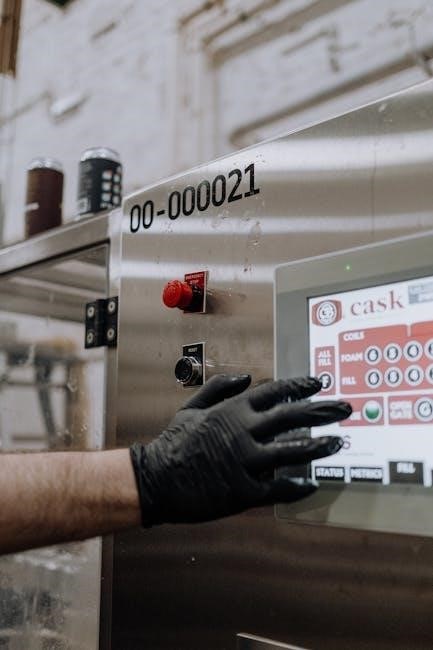The Navy Urinalysis Program is a critical initiative ensuring military readiness by detecting drug use through urine testing, upholding discipline, and maintaining high standards of health and performance.
Overview of the Program’s Purpose and Importance
The Navy Urinalysis Program is designed to uphold the Navy’s zero-tolerance policy on illegal drug use, ensuring military readiness and operational integrity. By detecting substances such as cocaine, cannabis, and amphetamines, the program maintains discipline and promotes a safe, healthy environment. It plays a vital role in safeguarding national security by ensuring personnel are fit for duty. The program also supports the Navy’s mission to maintain high standards of performance and ethical conduct. Regular testing fosters a culture of accountability and deterrence, aligning with the broader goal of protecting the Navy’s reputation and operational effectiveness. Its importance lies in preserving the trust and reliability of military personnel.

Purpose and Objectives of Urinalysis Testing in the Navy
The primary purpose of the Navy’s urinalysis testing is to detect illegal drug use, ensuring military readiness, safety, and discipline. It aims to maintain a drug-free environment, uphold ethical standards, and protect personnel and mission success by identifying substances like cocaine and cannabis. Regular testing reinforces the Navy’s zero-tolerance policy and promotes a culture of accountability and deterrence. This ensures operational effectiveness and the overall well-being of service members.
Maintaining Military Readiness and Discipline
The Navy Urinalysis Program plays a vital role in maintaining military readiness by ensuring personnel are fit for duty and free from drug-related impairments. Drug use can compromise decision-making, reflexes, and overall performance, which are critical in high-stakes military operations. By identifying substance use through regular urinalysis testing, the program helps prevent accidents, reduces risks, and ensures operational safety. Additionally, it reinforces discipline within the ranks, upholding the Navy’s strict standards and code of conduct. A drug-free force is better equipped to meet mission demands and maintain national security. This proactive approach fosters a culture of accountability and professionalism throughout the fleet.
Structure and Organization of the Navy Urinalysis Program
The Navy Urinalysis Program is structured to ensure oversight and compliance, with the Urinalysis Program Coordinator (UPC) managing testing protocols, specimen handling, and reporting procedures.
Role of the Urinalysis Program Coordinator (UPC)
The Urinalysis Program Coordinator (UPC) plays a pivotal role in managing the Navy’s drug-testing program. They oversee random urinalysis screenings, ensuring compliance with Navy instructions and guidelines. The UPC is responsible for specimen collection, handling, and submission to forensic toxicology laboratories. They also maintain accurate records, ensure confidentiality, and provide training to personnel. The UPC must be an E-7 or above, a GS-06 civilian, or equivalent, ensuring the program’s integrity and adherence to protocols. Their duties include scheduling tests, monitoring results, and reporting discrepancies to the chain of command, thus supporting the Navy’s zero-tolerance policy on drug use.
Chain of Command and Reporting Procedures
The chain of command and reporting procedures are essential for maintaining accountability and transparency within the Navy Urinalysis Program. Positive test results are immediately reported to the commanding officer, ensuring timely action. The Urinalysis Program Coordinator (UPC) serves as the primary liaison, overseeing the entire process and ensuring adherence to Navy instructions. All findings are documented and transmitted securely to higher authorities, with strict confidentiality to protect individual privacy. This structured reporting system ensures that disciplinary actions, medical evaluations, and further investigations are conducted fairly and in accordance with established protocols. The chain of command guarantees that policies are enforced consistently across all units.

Procedures for Urinalysis Testing
The Navy’s urinalysis testing involves random selection of personnel, secure specimen collection, and adherence to strict handling procedures to ensure accuracy and integrity of results.
Random Testing Protocols and Frequency
The Navy conducts random urinalysis testing to maintain a deterrent effect and ensure compliance with its zero-tolerance drug policy. Testing frequency varies, with commands required to test a minimum percentage of personnel monthly. The random selection process is managed through the Navy Drug Screening Program (NDSP) computer system, ensuring unbiased and unpredictable testing schedules. This approach supports military readiness and upholds the highest standards of discipline and health within the naval community. Regular testing ensures early detection of drug use, promoting a safe and effective work environment for all personnel. The program’s structure is designed to be fair, consistent, and enforceable across all commands.
Specimen Collection and Handling Procedures
The Navy Urinalysis Program follows strict protocols for specimen collection and handling to ensure accuracy and integrity. Personnel are required to provide urine samples in approved containers under direct observation to prevent tampering. Samples are then sealed, labeled, and documented with chain-of-custody forms to maintain accountability. Once collected, specimens are stored securely and promptly submitted to forensic toxicology laboratories for analysis. Proper handling procedures are critical to avoid contamination and ensure reliable test results. These measures safeguard the integrity of the testing process, upholding the program’s effectiveness in detecting substance use and maintaining military discipline. Adherence to these protocols is mandatory for all participants.

Handling Urinalysis Results
The Navy handles urinalysis results through secure digital systems, ensuring confidentiality and proper documentation. Positive results trigger disciplinary actions per Navy guidelines, managed by UPCs.
Reviewing and Interpreting Test Outcomes
The Navy employs secure digital systems to review and interpret urinalysis results, ensuring accuracy and confidentiality. Positive results are confirmed by forensic toxicology labs, while negative outcomes are documented for records. Commanders and UPCs review findings to determine disciplinary actions, adhering to strict protocols. Medical professionals interpret results to identify false positives or medical exceptions. The process maintains discipline and readiness, ensuring compliance with Navy instructions. All results are handled confidentially, with access restricted to authorized personnel. This structured approach ensures fairness and accountability, upholding the Navy’s zero-tolerance policy on drug use. The system is designed to protect both the individual and the organization.
Confidentiality and Documentation Standards
The Navy strictly enforces confidentiality and documentation standards for urinalysis results to protect individual privacy and maintain trust. All test outcomes are securely stored in encrypted systems, accessible only to authorized personnel. Documentation includes detailed records of specimen collection, testing procedures, and results interpretation, ensuring transparency and accountability. Commands must adhere to strict guidelines to prevent unauthorized disclosure. Any breach of confidentiality is treated as a serious offense. Standardized reporting formats are used to maintain consistency across the fleet. These measures ensure that the urinalysis program operates fairly while safeguarding sensitive information. Compliance with these standards is essential for upholding the program’s integrity and effectiveness.

Legal and Policy Compliance
The Navy urinalysis program adheres strictly to legal and policy standards, ensuring compliance with Navy instructions and federal regulations to maintain a drug-free military environment and uphold justice.
Adherence to Navy Instructions and Guidelines
The Navy’s urinalysis program strictly follows established instructions and guidelines to ensure consistency and fairness in drug testing. These guidelines, outlined in specific Navy directives, dictate procedures for specimen collection, handling, and testing to prevent tampering and ensure accuracy. Commands are required to appoint a Urinalysis Program Coordinator (UPC) who oversees compliance with these protocols. Regular training for UPCs is mandated to maintain proficiency in handling urinalysis processes. Adherence to these standards is crucial for upholding the integrity of the program, maintaining military readiness, and enforcing the Navy’s zero-tolerance policy on drug use. Compliance is rigorously monitored to ensure all procedures are followed correctly.
Consequences of Positive Test Results
A positive urinalysis test result in the Navy leads to severe disciplinary actions, reflecting the military’s zero-tolerance policy toward drug use. Personnel found positive are subject to administrative separation, loss of security clearances, and potential criminal charges under the Uniform Code of Military Justice (UCMJ). Commanders are notified, and individuals may face non-judicial punishment or court-martial. Additionally, positive results can result in mandatory rehabilitation programs, loss of rank, and forfeiture of pay. The consequences underscore the Navy’s commitment to maintaining a drug-free force, ensuring readiness, and upholding disciplinary standards. These actions aim to deter drug use and maintain unit cohesion and operational integrity.

Recent Updates and Changes in the Program
The Navy has banned products designed to defeat urinalysis testing and adjusted protocols during COVID-19 to ensure continued testing while minimizing exposure risks, maintaining program integrity.
Ban on Urinalysis-Defeating Products
The Navy has implemented a strict ban on products designed to circumvent urinalysis testing, reinforcing its zero-tolerance policy on drug use. This measure aims to ensure the integrity of the drug screening process by preventing individuals from evading detection. The ban applies to all substances, devices, or methods that could alter or mask drug test results. This change underscores the Navy’s commitment to maintaining a drug-free environment, crucial for operational readiness and safety. By eliminating such products, the program ensures accurate and reliable test outcomes, upholding discipline and accountability across all ranks. This proactive step reinforces the program’s effectiveness in detecting illicit drug use.
Impact of COVID-19 on Testing Protocols
The COVID-19 pandemic necessitated adjustments to the Navy’s urinalysis testing protocols to balance public health safety with mission requirements. While some units temporarily scaled back testing to minimize exposure risks, the Navy maintained its zero-tolerance drug policy. For instance, Navy SEALs resumed random urinalysis testing after a brief reduction in testing frequency during the pandemic’s peak. Commanders emphasized the importance of preserving the deterrent effect of drug testing. Despite logistical challenges, the program adapted to ensure operational readiness and compliance with health guidelines. The Navy’s commitment to drug testing remained steadfast, reflecting its priority on maintaining discipline and a drug-free military environment.

Resources and Support for Implementation
The Navy provides comprehensive resources, including training for Urinalysis Program Coordinators and access to forensic toxicology data, to ensure effective program execution and compliance with policies.
Training and Guidance for UPCs
The Navy offers detailed training and guidance for Urinalysis Program Coordinators (UPCs) to ensure effective implementation of the program. UPCs receive instruction on random testing protocols, specimen handling, and result interpretation. Training materials, including online resources and video guides, are provided to assist coordinators in maintaining compliance with Navy instructions. Additionally, UPCs are required to conduct urinalysis screenings at least four times a month using the Navy Drug Screening Program (NDSP) computer. These resources help UPCs perform their duties accurately, ensuring the integrity and efficiency of the urinalysis program across all commands. Proper training is essential for upholding the Navy’s zero-tolerance drug policy.
Accessing Forensic Toxicology Data and Tools
The Navy provides secure online platforms for accessing forensic toxicology data and tools, ensuring accurate and efficient urinalysis testing. Through the Forensic Toxicology Drug Testing Laboratory (FTDTL) website, authorized personnel can review test results, access statistical data, and retrieve necessary documentation. The Navy Drug Screening Program (NDSP) also offers digital tools for managing urinalysis operations, including random testing protocols and specimen tracking. These resources enable commands to maintain compliance with Navy instructions and uphold the integrity of the drug-testing program. Regular updates to these systems ensure alignment with the latest advancements in toxicology and testing procedures, supporting the Navy’s zero-tolerance drug policy.
